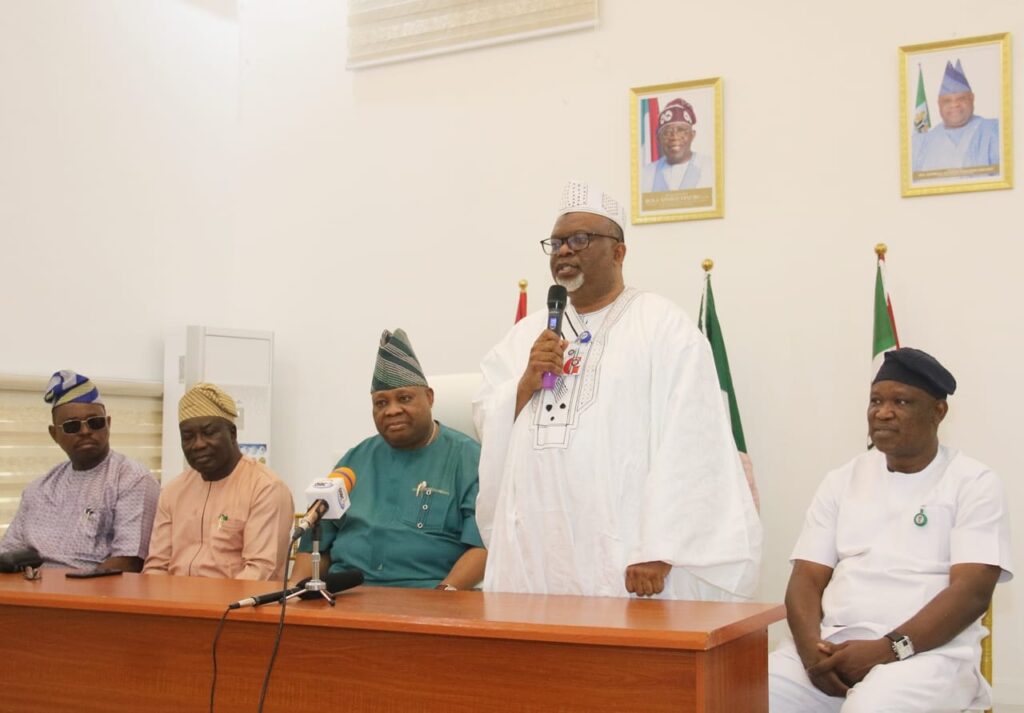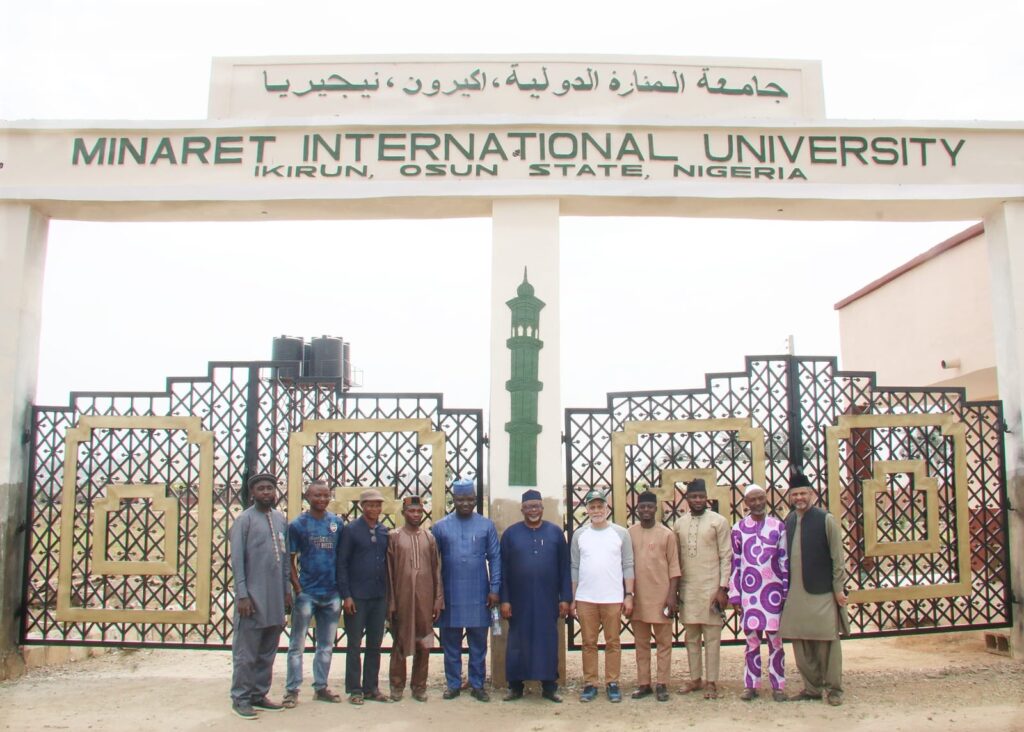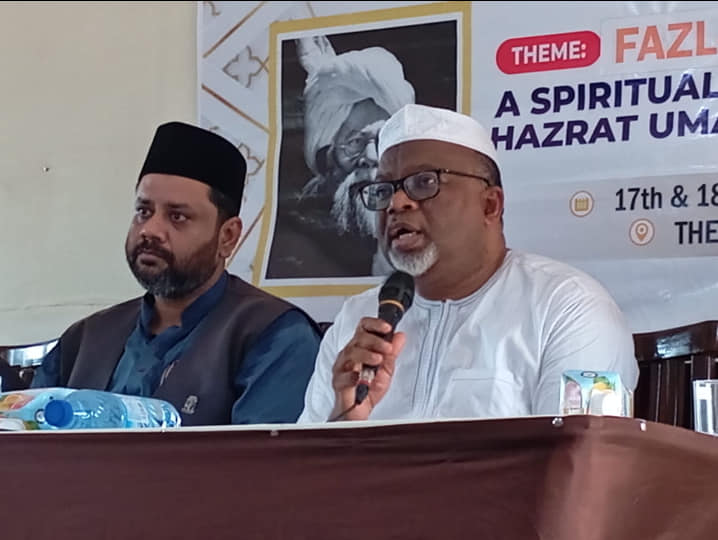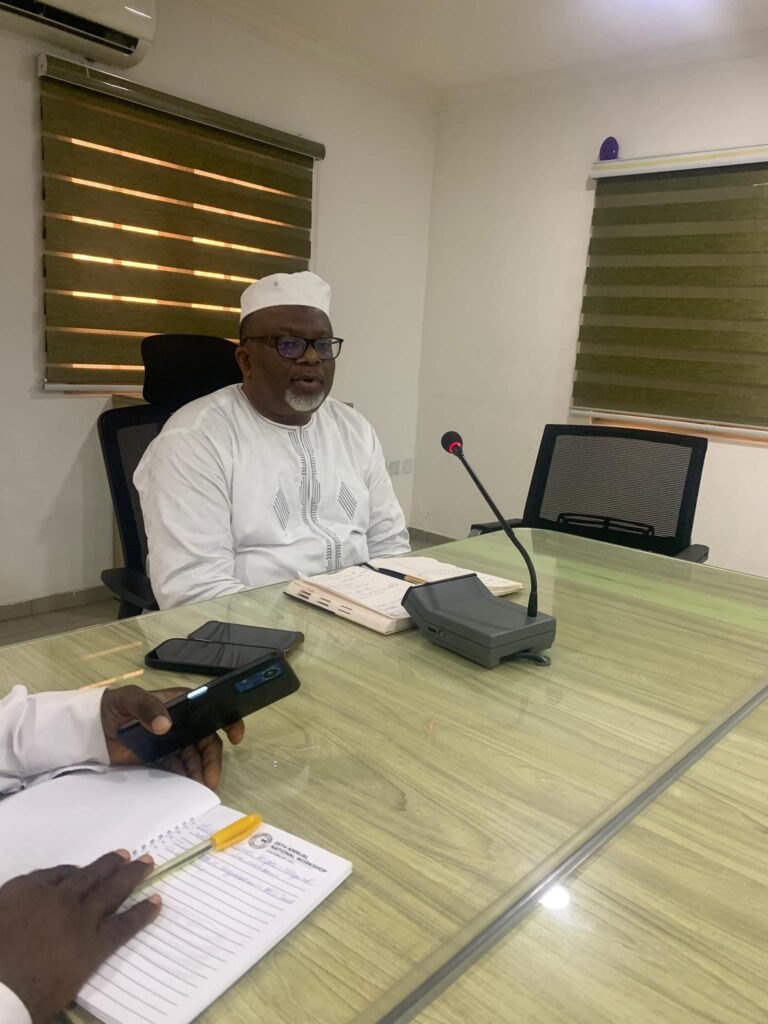Courtesy Visit to His Excellency Governor Ademola Adeleke of Osun State by the Amir sahib Ahmadiyya Muslim Jama’at of Nigeria

On March 19, 2024, the leadership of the Jama’at and members of the Trustee of the proposed Minaret International University, Ikirun, led by Amir Sahib Ahmadiyya Muslim Jama’at of Nigeria, Alh. (Barr.) Alatoye Folorunso Abdul Azeez, paid a courtesy visit to His Excellency Governor Ademola Adeleke of Osun State. The courtesy visit to His Excellency, Governor Ademola Adeleke of Osun State by the leadership of the Jama’at and members of the Trustee of Minaret International University, Ikirun, was a significant step towards garnering support for the proposed university project. The warm reception and positive engagement from Governor Adeleke reflect the potential for fruitful collaboration between the government and the Jama’at in advancing the educational landscape of Osun State. With continued dialogue and cooperation, the vision of Minaret International University as a beacon of quality education in the state can be realized, benefiting the people of Osun State and beyond. The courtesy visit served as an opportunity for the leadership of the Jama’at to strengthen ties with the government of Osun State and garner support for the Minaret International University project. Governor Adeleke’s warm reception and positive feedback indicate potential collaboration and assistance from the government in realizing the goals of the university. The exchange of ideas and information during the meeting laid the groundwork for the commencement of the university and future cooperation between the government and the Jama’at in the field of education, with the shared goal of advancing the educational standards and opportunities for the people of Osun State. Amir Sahib Alh. (Barr.) Alatoye Folorunso Abdul Azeez took the opportunity to update Governor Adeleke on the developments regarding the proposed Minaret International University in Ikirun, Osun State. He highlighted the vision of the university to provide quality education that is accessible and affordable to all, emphasizing the importance of collaboration between the government and private institutions in advancing the educational landscape of the state. During the meeting, Governor Adeleke acknowledged the significant role that Ahmadiyya Muslim Jama’at of Nigeria has played in the education sector, both within the state and across the country. He commended the Jama’at for its dedication to uplifting educational standards and fostering a culture of learning. As a gesture of goodwill and appreciation, Amir Sahib Alh. (Barr.) Alatoye Folorunso Abdul Azeez presented Jama’at literatures to Governor Adeleke, showcasing the educational and humanitarian initiatives undertaken by Ahmadiyya Muslim Jama’at of Nigeria. His Excellency Governor Adeleke also presented a very admirable plaque to the Amir sahib. Overall, the courtesy visit was a fruitful endeavor, fostering goodwill and understanding between the Jama’at and the government of Osun State, and laying the foundation for collaborative efforts in the realm of education.
The Respected Amir sahib Ahmadiyya Muslim Jama’at of Nigeria visited the Proposed Minaret International University

24th February, 2024. The Amir, Ahmadiyya Muslim Jama’at of Nigeria, Alh. (Barr.) Alatoye Folorunso AbdulAzeez sahib has visited the Mini Campus site of the Proposed Minaret International University, Ikirun, Osun State (MIU). The Respected Amir sahib was joined by the Central Auditor from Markaz Mirza Mahmood Ahmad sahib and Iqbal Muhammad sahib, the Respected Mubaligh In Charge Maulvi Adnan Tahir sahib, the General Secretary of the Jama’at Alh. Abbas Olawale Iromini sahib, Dr. Samiullah Tahir sahib, the Assistant General Secretary, Mr. Nurudeen Akinreti sahib among other respected members of the Jama’at. The Amir sahib with his entourage was able to go round the Mini Campus site of the University to inspect each facility… Parts of the facilities inspected are; I. Vice Chancellor’s Office II Senate Chamber III. Meeting Hall IV. Admin Block V. Library VI. ICT Centre VII. Classrooms VIII. Male and Female hostels IX. Professors offices, among others. Education has always been of paramount importance in the history of the Jamaat. Right from its inception at the hands of the Promised Messiah (as), special attention was given to educating the younger generation of the Jamaat. The Ahmadiyya Muslim Jama’at supports modern education, and the establishment of this university is aimed to benefit from both Western and Islamic training. In Nigeria, Ahmadiyya was the first Muslim organisation to establish its own denominational primary school; Talimul Islam Ahmadiyya Primary School in Lagos in 1922, after which so many schools were established. We pray for the successful completion of the University.
Academic Symposium on “Fazl Umar: A Spiritual Reflection of Hazrat Umar (RA)”

On the 18th February 2024, the Amir sahib Alh. (Barr.) Alatoye Folorunso Abdul Azeez sahib presided over an Academic Symposium at Jamia Ahmadiyya Nigeria, delving into the theme “Fazl Umar: A Spiritual Reflection of Hazrat Umar (RA)”. The guest lecturer, Missionary Tasleem Sulaimon, did justice to the topic with his insightful discourse, shedding light on the spiritual essence of Hazrat Umar (RA) and his profound impact on Islamic history. The Amir sahib stated that, In the realm of academia, there exists a distinct dichotomy between theory and practice. While academics provide the theoretical framework, practitioners bring these theories to life through practical application. Life itself operates on the synergy between theory and practice. History provides us with the theoretical foundation, while the actions taken based on this knowledge constitute practical application. It is through this fusion that progress and development are achieved. Academic conferences serve as vital platforms for intellectuals to exchange ideas and delve into scholarly discourse. They offer unique insights and perspectives, distinct from those of practitioners. We are fortunate to have been blessed with Khulfa who possess both theoretical knowledge and practical wisdom. Their ability to integrate theory with practice serves as a guiding light for us all, inspiring us to apply our knowledge in practical endeavors. In essence, the Academic Symposium serves as a beacon of enlightenment, fostering a deeper understanding of our faith and its practical implications in our lives. The event was graced with, Missionary Incharge, Principal Jamia Ahmadiyya and among others.
Empowering Future Leaders: The Amir’s Collaborative Session with AMSA Executives

Yesterday 17th February 2024, the esteemed Amir sahib, Alhaji (Barr.) Alatoye Folorunso AbdulAzeez sahib, and the newly leadership of the Ahmadi Muslim Students Association of Nigeria (AMSA) heralded a pivotal moment in fostering collaboration and charting a progressive path forward for the association. Under the able guidance of the Amir sahib, the meeting was held at the National Headquarters, Ojokoro Lagos State, aimed at enhancing the efficacy and impact of AMSA’s initiatives across the nation. The team was led by the dynamic leadership, Hafiz Sulaimon Abdul Qudus, the gathering served as a forum to deliberate on various programs and assess the overall progress of AMSA. Among the focal points of discussion was the upcoming 3rd edition of the annual Quran Competition—an event emblematic of AMSA’s commitment to nurturing spiritual growth and fostering Quranic knowledge among its members. The Amir sahib’s unwavering support and encouragement underscored the importance of this esteemed competition in nurturing a generation of devout and knowledgeable Ahmadi Muslim students. Furthermore, the meeting shed light on the challenge of low participation among AMSA members in school activities—a concern that the Amir sahib and the AMSA leadership are committed to address through targeted strategies and proactive engagement efforts. Recognizing the invaluable role of social media as a platform for Tabligh, the discussion also explored innovative ways to leverage digital channels to amplify the message of Islam and broaden the reach of AMSA’s outreach endeavors. The Amir sahib’s guidance and wisdom served as a beacon of inspiration for the AMSA leadership, instilling a renewed sense of purpose and resolve in advancing the organization’s objectives. With the collective efforts and unwavering dedication of both the Amir sahib and the AMSA leadership, the future holds boundless promise for AMSA as it continues to empower and uplift Ahmadi Muslim students across Nigeria. Present at the meeting were Alhaji Abass Iromini, the General Secretary of the Ahmadiyya Muslim Jamaat (AMJ), along with the Assistant General Secretary, Bro. Nurudeen Akinreti, members of the AMSA National Executive, State President, and Unit President.
The Amir sahib Ahmadiyya Muslim Jama’at Visits Akoko Circuit, Ondo State.

The Respected Amir sahib, Ahmadiyya Muslim Jama’at of Nigeria had visited Akoko Circuit, Ondo State. During the outing, he paid a courtesy visit to Kabiesi Owa of Ogbagi at his Palace His Royal Highness Ọba Victor Olasehinde Adetona The Amir sahib also visited the Fadl-I-Omar Academy in Idoani and the Ahmadiyya Grammar School Ogbagi Akoko, Ondo State. He commissioned another Ahmadiyya Muslim Mosque donated by the Naib Amir Special Duties, Alhaj (Barr.) Kofo Alada sahib at Ugbe Akoko of the State. On the Amir’s entourage were the Mubaligh In Charge; Maulvi Adnan Tahir sahib, the General Secretary of the Jama’at, Alh. Abbas Olawale Iromini sahib, the Circuit President Akoko; Honorable Tajudeen Jamiu, the Circuit Missionary; Mr Hassan AbdulKareem and other respected members of the Jama’at. May Allah Subhanallah wa Ta’alaa continue to strengthen the Amir sahib. Aameen
The Ahmadiyya Muslim Jama’at of Nigeria Holds Tabligh Summit

The Ahmadiyya Muslim Jama’at of Nigeria has held a Tabligh Summit at Monatan, Ibadan. The Summit, which was chaired by the Amir sahib Ahmadiyya Muslim Jama’at of Nigeria, Alh. (Barr.) Alatoye Folorunso AbdulAzeez sahib, was to discuss the effectiveness of Tabligh, impact of Tarbiyyat on Tabligh, Retention of Nao Mubain, and Operations of Tabligh teams. The summit was attended by the Missionary in Charge, the Naib Amir Finance and Admin, the General Secretary of the Jama’at, the Sadr of Majlis Ansarullah amd Khudammul Ahmadiyya, The National Tabligh Secretary, Circuit Presidents, Central Missionaries, Circuit Missionaries of the South western states. The attendees of the summit had the opportunity to ask questions, and suggest possible solutions to various challenges. All questions and suggestions were attended to by the Amir sahib and resolutions were made through which a communique would be prepared and shared for implementation by the Jama’at.
Governor Ahmed Sule of Nassarawa States Hosts Amir Ahmadiyya Nigeria

January 31 2024 The Amir sahib Ahmadiyya Muslim Jama’at of Nigeria Alh. (Barr.) Alatoye Folorunso AbdulAzeez sahib paid a courtesy visit to His Execllency, Governor Ahmed Sule in his office, in Lafia, Nassarawa State. The Amir sahib congratulated the Governor on his reelection into the office and the subsequent triumph as pronounced by the Supreme Court of Nigeria. Alh. Alatoye sahib showered praise on the Governor for his continuous support for the service of Islam in mosque building, other activities, and for the Jama’at Ahmadiyya. Amir sahib spoke about Islam as a religion of peace, and maintained that it prohibits all forms of violence and encourages peaceful coexistence. He condemned all forms of killing in the name of religion and noted that those who act this, do not represent Islamic values. The Governor was informed about the Minaret International University, Ikirun, which shall be opened very soon by the Ahmadiyya Muslim Jama’at Insha’aAllah. This, in itself shows the commitment of the Ahmadiyya to education as it has established several other schools across the country. The Amir sahib invited His Excellency as Special Guest of Honor to the 70th Jalsa Salana Nigeria which shall hold in December 2024 at Ilaro, Ogun State. The Amir sahib also invited the Governor as Special Guest of Honour to the Majlis Khudammul Ahmadiyya Nigeria Ijtema and Majlis Ansarullah Nigeria Ijtema which shall hold in Abuja in April and September respectively Insha’aAllah. The Governor appreciates the visit of the Amir sahib and leadership of the Jama’at. He commended the Ahmadiyya Muslim Jama’at for its service to Islam and Humanity. The Governor promised to be available for some of the programmes he has been invited to by the Amir sahib. The Amir sahib at the visitation, was joined by the Missionary in Charge sahib, Maulvi Adnan Tahir, Naibeen Amir Finance and Administration; Alhaj Mufadhil Bankole, and Dr. Abdul Lateef Busari sahib; Naib Amir Tabligh and Tajneed, the Abuja Circuit President, Alhaj Ahmed Sanusi, the Central Missionary Abuja; Maulvi Nasir Mahmud sahib, Central Missionary Nassarawa, Maulvi Abdus Salam Olayinka sahib, Al-Haafidh Sulayman Kuku sahib and other respected members of the Jama’at.
EMIR KANO INAUGURATES A NEW AHMADIYYA HOSPITAL IN KANO

The Emir of Kano HRH. Alhaji Aminu Ado Bayero was joined by Amir sahib Ahmadiyya Muslim Jama’at of Nigeria Alh. (Barr) Alatoye Folorunso AbdulAzeez sahib to commission a newly built Ahmadiyya Hospital in Kano. The Missionary in Charge sahib, the Naibeen Amir, Kano State officials and other respected members of the Jama’at were also present at the event. The new hospital located on Kano-Zaria Road in Kano. Its foundation was performed by the Emir of Kano, His Royal Highness, Alhaji Aminu Ado Bayero in July 2021. He was assisted by the Commissioner for Health and the Amir Ahmadiyya Muslim Jamaat Nigeria Alhaji Alatoye Folorunso Azeez. The inauguration of the hospital, which is equipped with state-of-the-art facilities for 100 patients per day and offers laboratory services and general medical consultancy. It will be recalled the Ahmadiyya Muslim Jama’at established its first hospital in Nigeria in Apapa in the late 1950s and next on Bompai Road, Kano, in 1962. The hospitals have been providing healthcare to the teeming people of Lagos, Kano and other cities and towns. At the foundation laying ceremony of the new hospital in 2021, the Emir of Kano commended what he called the tremendous efforts of the Ahmadiyya Muslim community on health and education development in Nigeria and elsewhere around the world. The statement quoted a former Federal Commissioner for Telecommunication, the late Malam Aminu Kano, as saying in 1967 when he visited the first Ahmadiyya clinic in Apapa, Lagos, that: “The government and people of this country are appreciative of the humanitarian, religious and educational work of the Ahmadiyya Mission in Nigeria.” The Ahmadiyya Muslim Jama’at hospitals are located in New Bussa, Niger State; Apapa and Ojokoro, Lagos State; and Ijebu-Ode, Ogun State.
The Amir Ahmadiyya Muslim Jama’at of Nigeria Alh. (Barr) Alatoye Folorunso AbdulAzeez sahib, led the Jumua’t service at the Masjid Mubarak, Abuja.

With him were the Hon. Minister of State for Environment Dr. Iziaq Kunle Salako, the Naib Amir Tabligh and Tajneed Dr. Lateef Busari sahib, Naib Amir Special Duties Barr. Kofo Alada sahib, Maulvi Nasir Mehmood sahib, the Circuit President Alh. Ahmed Sanusi and other respected members of the Jama’at. The Amir sahib shall Insha’aAllah be inaugurating some Jama’at projects in Kano, including the new Ahmadiyya Hospital in the state. The inauguration of the hospital, which is equipped with state-of-the-art facilities for 100 patients per day and offers laboratory services and general medical consultancy, will be performed by the Emir of Kano, Alhaji Aminu Ado Bayero. Located off Kano-Maiduguri Road, the hospital’s foundation was laid by Emir Aminu Ado Bayero in July 2021. He was assisted at the ceremony by the Amir, Ahmadiyya Muslim Jama’at Nigeria, Alhaji Abdul-Azeez Alatoye, and then state Commissioner for Health. It will be recalled the Ahmadiyya Muslim Jama’at established its first hospital in Nigeria in Apapa in the late 1950s and next on Bompai Road, Kano, in 1962. The hospitals have been providing healthcare to the teeming people of Lagos, Kano and other cities and towns.
AMIR NIGERIA PAYS A COURTESY VISIT TO THE ASSISTANT INSPECTOR GENERAL OF POLICE

The Amir Ahmadiyya Muslim Jama’at of Nigeria Alh (Barr.) Alatoye Folorunso Abdul Azeez paid a courtesy visit to the AIG of the Police Zone 2, in Lagos. The Amir sahib, in his speech thanks the AIG for the visitation. Noting that the AIG has been a very good friend of the Jama’at right from when he was a DPO in Apapa, and would personally lead his team to attend to issues in his division. At his last visit to the Ahmadiyya Headquarters in Ojokoro, he was in the Commissioner of Police in Delta State, the Amir sahib prayed for his elevation, thereafter, he was promoted to the rank of AIG. The Amir speaks about Islam as a religion of peace, that, all forms terrorism, banditry or violence have no stand in Islam. He noted that those who engage in terrorism fight for any or all of the three things; Land and Territory, Power, and Resource Control, none of which is a pillar of Islam. Islam is a religion of Peace absolutely. The Amir mentioned that the Khalifatul Masih V Hazrat Mirza Masroor Ahmad (aba), the Worldwide Leader of the Ahmadiyya Community has been to several places, has always given sermons, has written books and has visited the world power, including the UK Parliament, the US Congress Alh. Alatoye sahib mentioned numerous works and efforts of the Jama’at in education, building of schools, in health building of hospitals with affordable healthcare being to communities where the Jama’at has hospitals, service to Humanity; under which we have Water for Life, Disaster Relief, Food Security, Global Health etc. and so many other efforts of the Jama’at in Nigeria and across the world. The Amir promised the AIG that the Ahmadiyya will continue to support the Police formations in ensuring security and safety of every Nigerian. The AIG Mohammed Ali Ari warmly received the Amir sahib and his entourage. He acknowledged that he knows the Ahmadiyya very well since when he was in Apapa, he spoke highly of Dr. Samiullah, the Jama’at Secreatry for Nusrat Jehan Board – A scheme that oversees the schools and hospitals of the Jama’at established by the 3rd Khalifa (raheemahullah). He thanked the Amir and members of delegation for their visit. The Amir sahib presented a number of Jama’at literatures to the AIG
